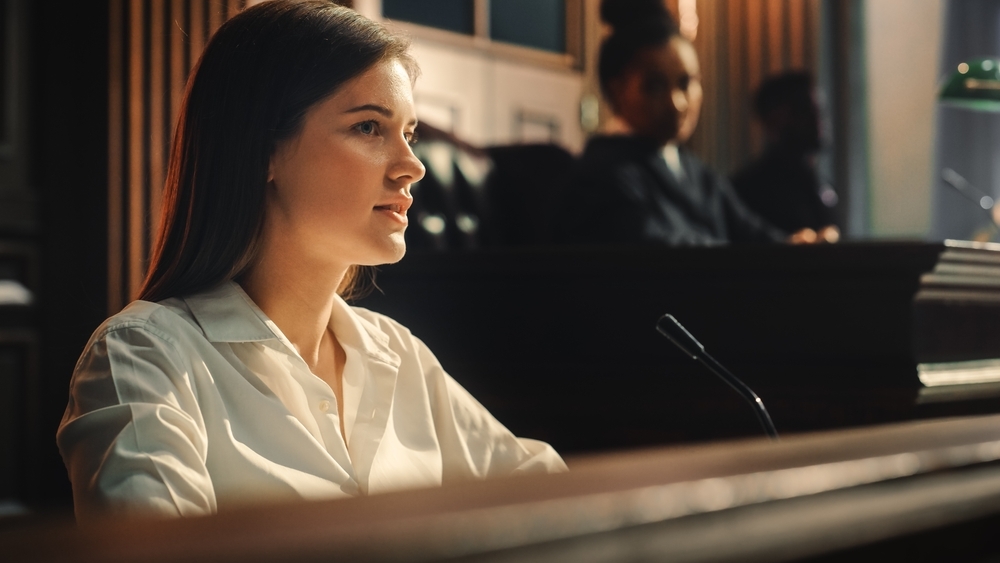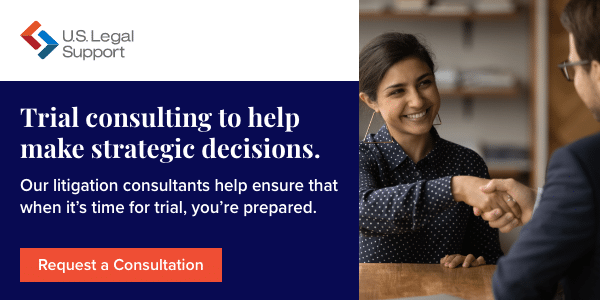Witness Preparation Tactics to Prep Clients

Before they swear to “tell the truth, the whole truth, and nothing but the truth,” witnesses need to be prepared for the process and challenges of testifying in a trial, deposition, or other legal proceeding.
How you prepare them can vary widely based on their experience, the type of testimony to be given, and their importance to your trial strategy. Preparation tactics can range from a short meeting and tips-and-tricks sheet to investing in professionally led research, training, and simulations.
The Importance of Witness Preparation
Millions of dollars—or years in prison—can hinge on the testimony of a key witness. Consider that:
- Eyewitness testimony is the leading evidence in more than 20% of criminal cases1
- Witness testimony can be the sole evidence in an arrest, conviction, or civil trial verdict2
- Expert witnesses can create 180° changes in how facts are interpreted
- Expert witnesses can provide useful testimony for civil lawsuits and cases
If the determination of a fact or issue is outside the common experience, expert witness testimony may be required to help prove an element of cause of action or defense.
You can’t afford to skip the right preparation tactics for each key witness. The jury will evaluate your client in part by your effectiveness and demeanor, and by that of your witnesses.
Types of Witnesses
In the U.S., there are three primary witness types. These are:
- Expert witnesses
- Lay, fact, or eye witnesses
- Character witnesses (this category is usually limited to criminal cases)
While expert witnesses should already be familiar with legal procedures and expectations, as well as presentation and communication skills, their testimony may be extensive and foundational to an argument or theme. Plus, they may need extra preparation or to try different approaches to ensure they can effectively inform and convince juries of the validity and applicability of their claims—especially if the information is complex or technical in nature.
On the other hand, most laypersons are only familiar with legal proceedings as presented in TV shows and movies. In these cases, preparing a witness for trial or other legal proceedings requires training on how to physically, mentally, and emotionally prepare for their day in court to testify effectively.
Witness Research
Before working directly with a witness—or making a final decision on whether or how to use them—you have homework to do. Researching witnesses can include:
- Reviewing expert witnesses’ videos, publications, and promotional materials
- Interview with a focus on their willingness, over- or under-communication, and red flags
- Social media and internet footprint review
- Background and credit checks
In addition to crafting interview or examination questions based on reviewing case details and strategies, this information-gathering specifically about the witness can help you understand how much and what type of preparation they would need to be effective for your case.
Steps to Ensure Witness Cooperation
Separate from determining what factual or expert testimony a witness can provide and their skill levels related to providing effective testimony, you also need to consider their level of cooperation.
Officials and members of the public who have no vested interest in a trial outcome may be irritated or impatient. They’re being asked to not only show up for the legal proceeding, but invest time and energy answering invasive questions, having their communication skills questioned, and invest unpaid hours in trial preparation.
Possible ways to increase their willingness and patience with trial prep include:
- Paying them a reasonable fee for their time as allowed by your jurisdiction
- Communicate that all expenses for travel, parking, food, etc., will be covered
- Appeal to ego based on their importance to the process
- Highlight any specific benefits to them, from experience to dinner conversation topics
Goals of Witness Preparation
Like many aspects of the law, testimony isn’t just about the facts. You need your witness to be capable of delivering a true story effectively. This means that preparing a witness for deposition or trial should lead them to:
- Understand exactly what to expect in terms of process, standards, and demeanor
- Overcome poor communication habits
- Reduce public speaking fears
- Successfully prepare for cross examination
A well-prepared witness can:
- Enhance the delivery of your theme
- Use timing and nonverbal cues to undermine the opposition during cross examination
- Grab and keep the jury’s attention and sympathy
- Respond with calm, confidence, and care throughout their testimony
Witness Preparation Training
Witness training is a preparation tactic that allows you to replace a “what to expect when you’re a witness” cheat sheet with in-depth training designed and administered by experienced trial consultants.
Training topics can be geared to cover general information or improve a specific witness’ abilities with:
- Spoken communication
- Nonverbal communication on the witness stand
- Courtroom etiquette (general and specific to the jurisdiction)
- Presentation techniques
- Testimony etiquette
- Overcoming cognitive tricks used in cross examination
- Common markers associated with lying or prevaricating
For remote and hybrid proceedings, training should also include on-camera presentations and platform use.
Mock Trials and Focus Groups
A mock trial can be an excellent tactic to help prepare expert witnesses’ complex testimony. Typically lasting either one day or a half-day, mock trials include individuals who play the court roles (plaintiff/prosecution and jury members). They can be used to run through any or all critical elements of a trial to test out specific evidence, arguments, themes, and witness performance. Hiring a jury consultant can be especially helpful during mock trials.
Focus groups are also arranged to gather feedback, though rather than a simulated trial experience, participants are simply asked to review specific aspects of the case that need feedback. Reviewing a recorded deposition testimony of a key witness, for example, can help identify how people who are demographically similar to potential jurors may react to a witness.
In both types of studies, participants can offer real-time reactions, provide detailed feedback, and point out the concerns, questions, or doubts they encountered. Discover more on mock trial focus group tactics.
The Practical Side of Witness Preparation
Most witnesses are needed for a single short appearance, but there are some trials and depositions that turn into marathons. Federal courts place a seven-hour daily limit on depositions; many states also limit per-day deposition testimony, with limits ranging from three to eight hours.3
Amidst all the prep related to courtroom expectations, don’t forget the basics:
Prepare Physically
The first step in making sure that long wait times, uncomfortable rooms, and stress or nerves don’t result in physical strain or discomfort that will start testimony on a bad note is for witnesses to take care of themselves. In order to stay alert, focused, and present throughout the proceedings, they need to:
- Get a good night’s sleep
- Stay hydrated
- Eat healthy meals and snacks
Dress Appropriately
It’s not just about showing up in a suit. Dress:
- Professionally, in business or “business casual” attire depending on the jurisdiction
- Conservatively, with no slogans, wild prints, or loud accessories
- Comfortably, in well-fitting clothes
Arrive Early
Ensure your witnesses arrive at least 15 minutes early. They should find the room where they’ll be called to testify as well as nearby bathrooms, and take a few minutes to gather their thoughts and be ready to proceed calmly.
Witness Preparation vs. Coaching
Instructing a witness on how to answer versus what to say can become a murky gray area, particularly for witnesses with challenging communication habits and self-presentation skills. Both your professional reputation and your client’s case can suffer, however, if you end up on the coaching end.
Witness preparation encompasses:
- Providing guidance on expectations, etiquette, and process of witness examination
- Offering general tips to boost witness credibility and effectiveness
- Reviewing testimony to strategize direct examination and avoid surprises
- Instructing the witness to avoid providing opinions, speculation, or unrequested facts
Coaching a witness, on the other hand, can lead to a criminal contempt of court finding or other penalties against trial lawyers caught doing so. It involves specifically directing or prompting witness testimony. This can include:
- A wink, headshake, or other gesture to the witness to suggest the answer to a question4
- Texting, chatting, or other communication providing guidance during testimony
- Verbal or nonverbal suggestion on whether to answer or decline a question, which obstructs the other party’s access to evidence
- The attempt at such communication, regardless of whether the witness receives it
Work with the Witness Preparation Experts
The outcome of your case could hang in the balance between your witness’ words and how the jury perceives them.
With more than 20,000 high-risk trials, arbitrations, and mediations nationwide—across nearly every practice area—the Trial Services division of U.S. Legal Support includes professionals from TrialQuest to bring the tools and expertise needed to prepare your witnesses, consult on jury strategies, and craft the optimum case story.
Plus, we offer jury research, mock trials, focus groups, trial graphics and trial presentations, court reporting and transcription, record retrieval and analysis, remote depositions, and more, to firms of all sizes and specialties.
Contact us today by phone, email, or website form to discuss how we can provide litigation support.
Sources:
- The Conversation. New research reveals how little we can trust eyewitnesses. https://theconversation.com/new-research-reveals-how-little-we-can-trust-eyewitnesses-67663
- Law Office of Carl Spector. Can I Be Charged With a Crime Based on Someone Else’s Testimony Alone? https://www.bergencriminalattorney.com/can-i-be-charged-with-a-crime-based-on-someone-elses-testimony-alone/
- United States Court of International Trade. Rule 30. Depositions by Oral Examination. https://www.cit.uscourts.gov/sites/cit/files/Rule%2030.pdf
- American Bar Association. ABA issues ethics guidance outlining model rule guardrails when lawyers prepare witnesses. https://www.americanbar.org/news/abanews/aba-news-archives/2023/09/ethics-guidance-witness-preparation/

Editoral Policy
Content published on the U.S. Legal Support blog is reviewed by professionals in the legal and litigation support services field to help ensure accurate information. The information provided in this blog is for informational purposes only and should not be construed as legal advice for attorneys or clients.


